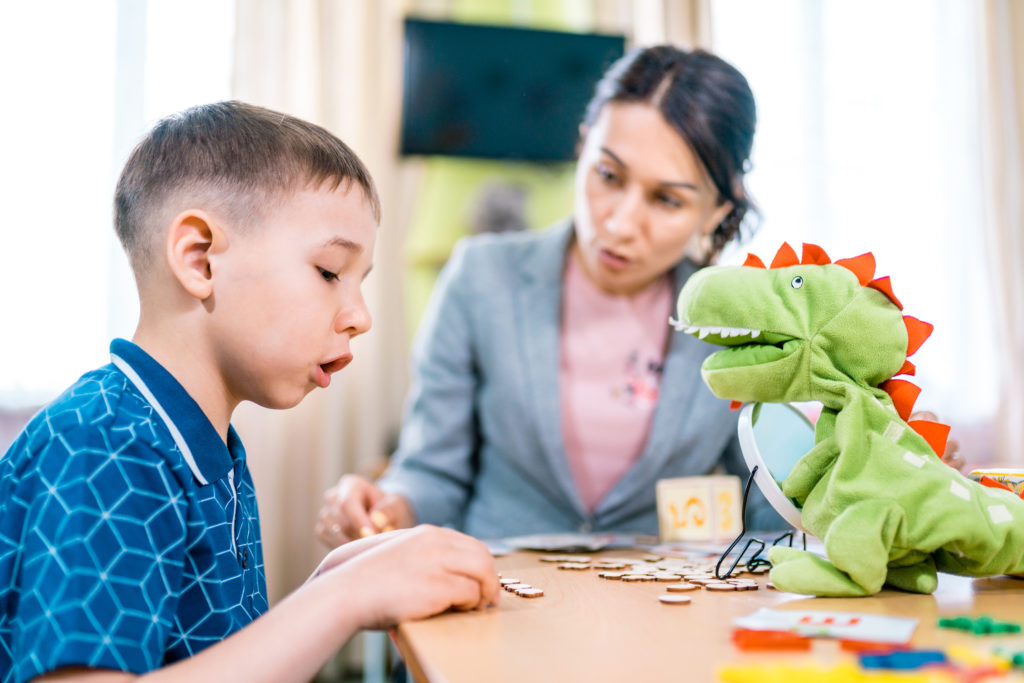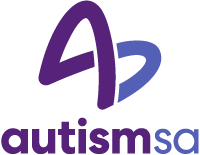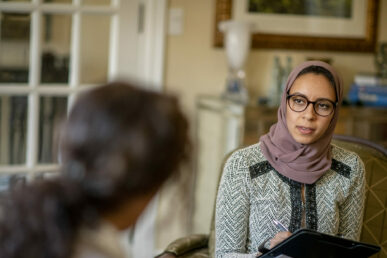What are assessments and plans?
Assessments are important for identifying an individual’s skills, strengths and challenges.
They also help to identify interests and learning styles, which can support the creation of plans that use specific resources, supports and therapies designed to enhance an individual’s capacity within a given setting or activity.
A plan may be designed to support the development of a specific skill, or as part of a holistic approach to development.
Assessments are important for identifying an individual's skills, strengths and challenges.
Autism SA specialises in undertaking assessments and developing plans for autistic individuals at all life stages across various therapies and support programs.
Speech and Language Assessments

A speech and language assessment can assess a number of areas associated with communication, including:
- Comprehension
- Verbal and non-verbal skills
- Speech sound development
- Functionality
- Intent, and
- Social communication.
How can I get a referral for a speech and language assessment?
The following people and professionals are able to make a referral to see one of Autism SA’s speech pathologists:
- Individuals
- Parents/carers
- General Practitioners
- Child Health Nurses
- Other health professionals
- Childcare workers, kindergarten and school teachers, and
- Community health organisations.
It is possible to make a self-referral, which means arranging an assessment yourself directly with Autism SA.
How can I arrange a speech and language assessment?
If you would like to find out more, please contact My Pathways via email mypathways@autismsa.org.au or phone 1300 288 476.
Mealtime Assessments and Plans

A mealtime assessment will usually be undertaken by Autism SA Speech Pathologists and Occupational Therapists who work collaboratively to assess and identify gaps in areas such as:
- Oral motor development and skills
- The phases of swallowing
- Sensory processing influences
- Food selectivity and volume
- Independence skills
- Posture and motor skills impacting on positioning, and
- Environmental impacts.
In addition to an assessment of the above skills, an Autism SA mealtime assessment can provide:
- A comprehensive multidisciplinary report
- Specific eating and drinking recommendations
- Sensory Profile outcomes
- Oral Eating and Drinking Care Plan, as deemed appropriate
- Recommendations and follow up of posture and appropriate equipment, as deemed appropriate
- Strategies to increase motivation and independence skills, and
- Communication and visual support at mealtime.
A mealtime assessment may determine that a personalised diet or an Oral Eating and Drinking Care Plan is required to provide the right nutritional balance.
How can I get a referral for a mealtime assessment?
The following people and professionals are able to make a referral to have a mealtime assessment with Autism SA:
- Individuals
- Parents/carers
- General Practitioners
- Child Health Nurses
- Other health professionals
- Childcare workers, kindergarten and school teachers, and
- Community health organisations.
It is possible to make a self-referral, which means arranging an assessment yourself directly with Autism SA.
How can I arrange a mealtime assessment?
If you would like to find out more, please contact My Pathways via email mypathways@autismsa.org.au or phone 1300 288 476.
Occupational Therapy Assessments

Occupational Therapy Assessments are used to identify strengths and challenges that may affect capacity for individuals on the spectrum of all ages. Areas assessed can include:
- Daily living/independence activities
- Gross and fine motor skills
- Perceptual difficulties
- Responses to sensory information
- Play and leisure skills
- Work-related skills
- Social skills
- Behaviour and emotion regulation, and
- Attention and/or concentration.
How can I get a referral for an occupational therapy assessment?
The following people and professionals are able to make a referral for an occupational therapy assessment with one of Autism SA’s therapists:
- Individuals
- Parents/carers
- General Practitioners
- Child Health Nurses
- Other health professionals
- Childcare workers, kindergarten and school teachers, and
- Community health organisations.
It is possible to make a self-referral, which means arranging an assessment yourself directly with Autism SA.
How can I arrange an occupational therapy assessment?
If you would like to find out more, please contact My Pathways via email mypathways@autismsa.org.au or phone 1300 288 476.
Behavioural and Educational Assessment Plans

Behavioural and educational assessments at Autism SA are carried out by qualified, registered and experienced psychologists. Plans are then devised and developed that can include behaviour support and emotional regulation strategies for children and young people on the autism spectrum.
How can I get a referral for a behavioural and educational assessment?
The following people and professionals are able to make a referral for a behavioural and educational assessment with one of Autism SA’s psychologists:
- Parents/carers
- General Practitioners
- Child Health Nurses
- Other health professionals
- Childcare workers, kindergarten and school teachers, and
- Community health organisations.
It is also possible to make a self-referral, i.e., to arrange an assessment yourself directly with Autism SA.
How can I arrange a behavioural and educational assessment?
If you would like to find out more, please contact My Pathways via email mypathways@autismsa.org.au or phone 1300 288 476.
Diagnostic Assessments

Autism assessments at Autism SA are carried out by the Diagnostic Team, consisting of psychologists and speech pathologists. The specific requirements of the autism diagnostic process can vary, depending on need, and the assessment process is different for children and adults.
Autism assessment for children
After receiving a written referral, the diagnostic team uses questionnaires to gather preliminary information regarding the child’s behaviours and interactions in different settings.
Following on from this, observation and interaction are key elements of an autism assessment for a child.
“…observation and interaction are key elements of an autism assessment for a child.”
These take place with a member of the Diagnostic Team in a dedicated space, and while this occurs, parents or carers are interviewed and detailed information about their child’s development and current patterns of behaviour is recorded.
Assessments are videoed (with parental permission), and in some cases the Diagnostic Team will also want to observe a child in another setting, such as at kindergarten or at school. The time required for an assessment can vary, from between 1 to 2½ hours.
The Diagnostic Team will then produce a report based on its findings, explaining the outcome and the reasons for it.
If your child receives a diagnosis of autism, we will inform the Autism SA My Pathways Team. A Pathways Consultant will then make contact with you directly (often by SMS in the first instance) in order to arrange a Newly Diagnosed Support meeting (either online, over the phone or face to face), where your ongoing needs and options in terms of next steps, support, available programs, NDIS funding, etc., will all be discussed.
This meeting will give you an opportunity to discuss your specific circumstances and needs, and the ways in which Autism SA can support you on your autism journey.

Autism assessment for adults
Although the diagnostic criteria for autism in adults is the same as for children, the way in which signs and characteristics are assessed against these criteria will likely be different.
Adults generally come to Autism SA for an assessment either through self-referral, i.e., they make a referral themselves or one is made on their behalf by a partner or family member, or they are referred to us by a GP, nurse or allied health professional. Assessments can only take place if the adult consents to the process in writing.
In either case, as part of the referral process you or your referrer will have been asked to complete a Diagnostic Assessment Referral form. After the Diagnostic Team receives the referral, you will then be sent an 8-page questionnaire to complete, and which asks you to give relevant information about specific areas of your development as a child, a teenager, and then into adulthood.
You will also be asked to give a similar questionnaire to a member of your family or someone who knows you very well, and to complete a standardised screening tool for Autism Spectrum Disorder.
“At your assessment, you will be asked questions about any signs and characteristics of autism that you might display in terms of your social communication and interaction, or any restricted, repetitive patterns of behaviour that you exhibit.”
At your assessment, you will be asked questions about any signs and characteristics of autism that you might display in terms of your social communication and interaction, or any restricted, repetitive patterns of behaviour that you exhibit. Other relevant factors may also be examined, such as any co-occurring conditions or whether you have previously received another diagnosis.
The Diagnostic Team will then write a report based on its findings, explaining the conclusion and the reasons for it. This will be sent between 2 to 4 weeks after an assessment, and if you have been referred to Autism SA by another healthcare professional, we will also send them a copy of the report, with your permission. The report will be only be shared with people for whom you give express consent.
If you receive a diagnosis of autism, we will inform the Autism SA My Pathways Team. A Pathways Consultant will then make contact with you directly (often by SMS in the first instance) in order to arrange a Newly Diagnosed Support meeting (either online, over the phone or face to face), where your ongoing needs and options in terms of next steps, support, available programs, NDIS funding, etc., will all be discussed.
How can I get a referral for a diagnostic assessment?
There are a number of ways in which you can arrange an autism assessment with the Diagnostic Team for yourself or for someone in your care.
Referral to Autism SA by a healthcare professional
It might be that you have sought advice from your doctor after you have noticed some signs and characteristics of autism in yourself, your child or someone you care for. Or it may be that an education professional, or someone you know with experience of autism, has suggested that you seek some professional help for your child or yourself.
Self referral to Autism SA
Although you can be referred to Autism SA by a GP or an allied health professional, it is possible to make a self-referral, i.e., to arrange an assessment yourself directly with Autism SA. All referrals must be in writing.
This can be done by parents or carers of a child, or on your own behalf if you are an adult. There is no upper age limit for seeking an autism assessment, and it is not uncommon for people in later life to want a formal diagnosis.
You can make a self referral in a number of ways:
- Complete an online referral form
- Complete a hard copy of the referral form and post it to Autism SA
- Telephone the Diagnostic Team via the Autism SA
- Infoline, and they can email or send you a referral form, or
- Email the Diagnostic Team.
How can I arrange a diagnostic assessment?
If you would like to find out more, please contact My Pathways via email mypathways@autismsa.org.au or phone 1300 288 476.
Enquire about an assessment












